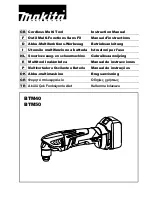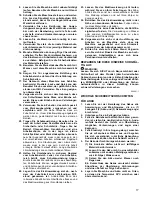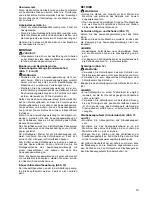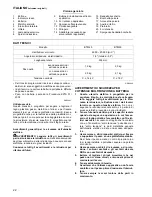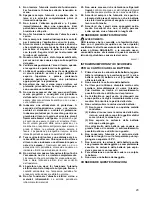
8
Hex wrench storage (Fig. 10)
When not in use, store the hex wrench as shown in the
figure to keep it from being lost.
OPERATION
WARNING:
• Before starting the tool and during operation, keep your
hand and face away from the application tool.
• Do not apply excessive load to the tool which may
cause a motor lock and stop the tool.
Cutting, sawing and scraping (Fig. 11)
Put the application tool on the workpiece.
And then move the tool forward so that the application
tool movement does not slow down.
NOTE:
• Forcing or excessive pressure on the tool may reduce
efficiency.
• Before cutting operation, it is recommended to preset
the orbital stroke rate 4 – 6.
Sanding (Fig. 12)
WARNING:
• Do not reuse a sanding paper used for sanding metal
to sand wood.
• Do not use a worn sanding paper or sanding paper
without grit.
Apply a sanding paper on the workpiece.
NOTE:
• Using a test material sample to try is recommendable
to determine a correct orbital stroke rate suitable for
your work.
• Use a sanding paper with the same grit until sanding
the whole workpiece is completed. Replacing a sand-
ing paper with different grit sanding paper may not get
a fine finish.
Dust extraction attachment (optional accessory)
(Fig. 13 & 14)
• Install dust nozzles and dust attachment.
• Install the nozzle band on the tool so that its protru-
sions fit in the holes in the tool to secure it.
• Put the felt ring and the sanding pad on the dust attach-
ment and then secure them with the application tool
installation bolt.
When you wish to perform cleaner operation, connect a
vacuum cleaner to your tool. Connect a hose of vacuum
cleaner to the dust extraction attachment (optional
accessory).
MAINTENANCE
CAUTION:
• Always be sure that the tool is switched off and the bat-
tery cartridge is removed before attempting to perform
inspection or maintenance.
• Never use gasoline, benzine, thinner, alcohol or the
like. Discoloration, deformation or cracks may result.
To maintain product SAFETY and RELIABILITY, repairs,
carbon brush inspection and replacement, any other
maintenance or adjustment should be performed by
Makita Authorized Service Centers, always using Makita
replacement parts.
OPTIONAL ACCESSORIES
CAUTION:
• These accessories or attachments are recommended
for use with your Makita tool specified in this manual.
The use of any other accessories or attachments might
present a risk of injury to persons. Only use accessory
or attachment for its stated purpose.
If you need any assistance for more details regarding
these accessories, ask your local Makita Service Center.
• Segment saw blade
• Round saw blade
• Plunge cut saw blade
• Scraper (rigid)
• Scraper (flexible)
• Serrated seg blade
• General joint cutter
• HM remover
• HM seg saw blade
• HM sanding plate
• Diamond seg sawblade
• Sanding pad
• Adapter
• Abrasive paper delta (red / white / black)
• Fleece delta (medium / coarse / without grit)
• Polishing felt delta
• Hex wrench
• Dust extraction attachment
• Makita genuine battery and charger
NOTE:
• Some items in the list may be included in the tool pack-
age as standard accessories. They may differ from
country to country.
ENG905-1
Noise
The typical A-weighted noise level determined according
to EN60745:
Work mode: sanding
Sound pressure level (L
pA
): 78 dB (A)
Uncertainty (K): 3 dB (A)
The noise level under working may exceed 80 dB (A).
Work mode: cutting with plunge cut saw blade
Model BTM40
Sound pressure level (L
pA
): 82 dB (A)
Sound power level (L
WA
): 93 dB (A)
Uncertainty (K): 3 dB (A)
Model BTM50
Sound pressure level (L
pA
): 84 dB (A)
Sound power level (L
WA
): 95 dB (A)
Uncertainty (K): 3 dB (A)
Work mode: cutting with segmential saw blade
Sound pressure level (L
pA
): 81 dB (A)
Sound power level (L
WA
): 92 dB (A)
Uncertainty (K): 3 dB (A)
Work mode: scraping
Model BTM40
Sound pressure level (L
pA
): 81 dB (A)
Sound power level (L
WA
): 92 dB (A)
Uncertainty (K): 3 dB (A)
Model BTM50
Sound pressure level (L
pA
): 83 dB (A)
Sound power level (L
WA
): 94 dB (A)
Uncertainty (K): 3 dB (A)
Wear ear protection

